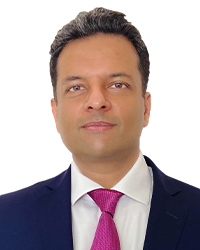Japan is India’s fifth largest investor, with trade growing to USD20.5 billion in 2021-2022. This relationship promises exponential growth as India has unveiled its policy on localising semiconductor manufacturing and the global value chain. The countries have signed a memorandum of cooperation on semiconductor manufacturing and capacity enhancement, including creating an organisation to facilitate inter-governmental and industry partnerships. These developments combine Japan’s unparalleled expertise in high value manufacturing with India’s pool of engineering, software and design talent, promising a robust and productive partnership.

Senior partner
Kochhar & Co.
India introduced the guidelines for setting up semiconductor fabs in May 2023 to encourage investment in silicon complementary metal-oxide semiconductor fabrication plants by local and overseas companies. The guidelines cover logic components, memory components, digital integrated circuits, analogue integrated circuits, mixed signal integrated circuits and systems on a chip. They parallel similar schemes for setting up display fabs, compound semiconductors, silicon photonics, sensors fabs and semiconductor ATMP and OSAT facilities, and a Scheme for Designed Linked Incentives (scheme). This government policy blitz aims to overcome the challenges of semiconductor manufacturing. The guidelines and scheme create an ecosystem for semiconductor fabrication, infrastructure, design and production-ready technology, supported by a favourable import duty regime.

Partner
Kochhar & Co.
The guidelines cover semiconductor fabs producing 300mm wafer products with an installed capacity of 40,000 wafer starts per month or above. Applicants must possess production-grade licensed technologies and have plans for manufacturing advanced nodal technologies through licensing or development. Around 50% of the project cost will be subsidised, provided the applicant meets a threshold for capital expenditure of INR200 billion (USD600 million) and revenue of INR75 billion. The government will also offer financial support for R&D expenditure, common facility centres and the preferential procurement of electronic products.
Allowable expenditure includes land and building costs, plant, machinery, clean rooms, equipment and utilities; R&D; transfer of technology agreements; interest during construction and insurance. Costs must be paid within six years of approval. The guidelines do not set export targets, a welcome change from earlier schemes. The particular agency assesses applicants on their project implementation capacity, operating capability, technology, employment generation, added value and financial parameters. After project approval, process technologies and fiscal support are negotiated.

Principal associate
Kochhar & Co.
The guidelines for semiconductor fabs are comprehensive, showing India’s commitment to the future of domestic technology. Several states have policies providing additional fiscal incentives, augmenting the government schemes and giving investors ample choice of state land, infrastructure, ultrapure water, logistics, and reliable power.
The application form in the guidelines allows flexibility and accommodation in applicants’ technology specifications, sourcing of raw materials, technology upgrades, operational requirements and employment. Omitting sales targets and export commitments evidences a liberal regulatory system focusing on facilitating technology transfer, rather than prescriptive and penal adherence to targets and outcomes.
Japanese investors stand to benefit from the new regulatory regime but all applicants should be aware of the following details. As the application requires extensive technology disclosure, applicants should insist on advance NDAs. Agencies will usually agree to this. Benefits include exemption from import duties and goods and services tax, and assistance with visas. Local hiring involves state driven, piecemeal labour laws. Applicants should note how incentives are paid and any associated milestones. Third party consents need to be obtained. Long-term success depends on a detailed support agreement with the particular agency, setting out the support offered, timelines and dispute resolution mechanisms.
These developments offer the opportunity for strategic semiconductor partnerships between India and Japan as led by Rapidus and others entering the full value chain.
Pradeep Ratnam is a senior partner, Anshuman Singh is a partner and Samad Ali is a principal associate at Kochhar & Co.

New Delhi (head office):
Kochhar & Co. Suite # 1120
-21, 11th Floor, Tower – A, DLF
Towers, Jasola District Center,
Jasola – 110 025, India
India offices: New Delhi,
Bengaluru, Mumbai, Chennai,
Hyderabad, Gurugram and
Chandigarh
Overseas offices: Dubai,
Chicago and Singapore
Contact details:
T: +91 11 4111 5222, +91 11 4312 9300
E: delhi@kochhar.com, info@kochhar.com





























